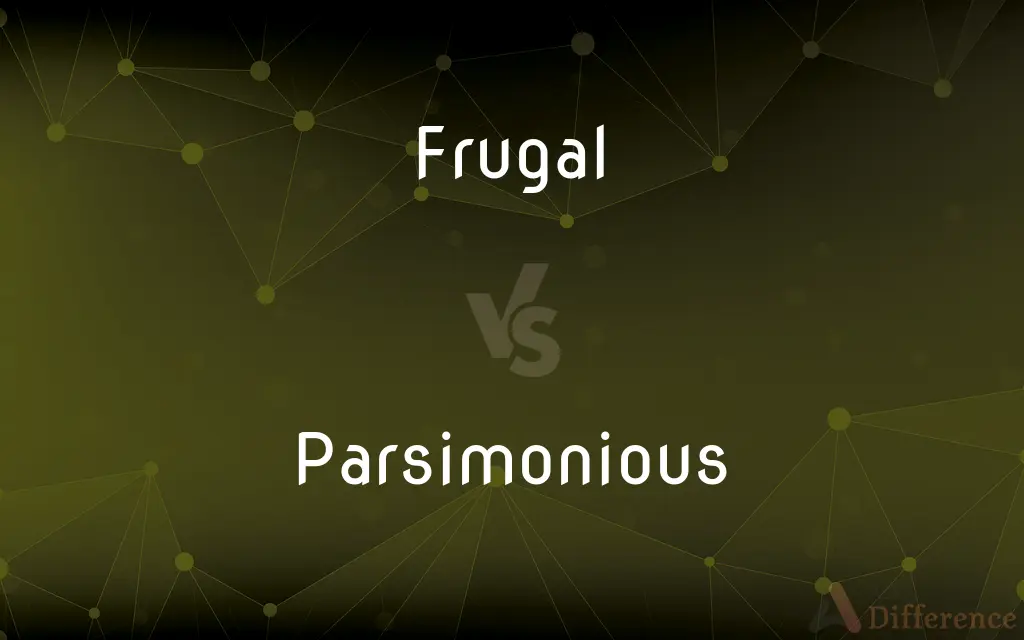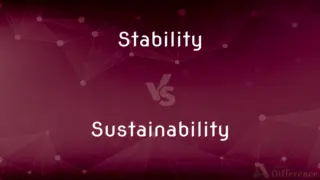Frugal vs. Parsimonious — What's the Difference?
By Tayyaba Rehman — Updated on September 24, 2023
"Frugal" refers to being economical and avoiding waste, while "Parsimonious" implies extreme unwillingness to spend money or use resources.

Difference Between Frugal and Parsimonious
Table of Contents
ADVERTISEMENT
Key Differences
"Frugal" and "Parsimonious" both suggest a careful approach to resources, but they carry distinct nuances. Being "Frugal" often evokes a positive sense, relating to wise and prudent use of resources to avoid waste. Someone frugal is careful with money, but not to the point of stinginess. They might seek deals or live a modest lifestyle, prioritizing savings. On the other hand, "Parsimonious" has a more negative undertone, implying an excessive degree of thriftiness, often to the point of being overly tightfisted.
In common language, if someone is complimented for being "Frugal", it’s because they’ve demonstrated a skillful and thoughtful way of managing finances or other resources. "Parsimonious", conversely, is seldom used as a compliment. It’s more likely to describe someone who goes beyond being merely economical and enters the realm of being miserly.
The distinction also lies in intention. A "Frugal" individual may choose to save money to achieve a bigger goal, such as purchasing a home or traveling. Their thriftiness is a means to an end. Meanwhile, a "Parsimonious" individual avoids spending at all costs, often sacrificing comfort or even necessities.
In essence, while both words reflect a certain level of thriftiness, "Frugal" leans towards prudence and resourcefulness, whereas "Parsimonious" implies an almost negative, stringent economization.
Comparison Chart
Meaning
Economical, avoiding waste.
Extremely unwilling to spend money or use resources.
ADVERTISEMENT
Connotation
Positive, wise use of resources.
Negative, overly stingy.
Usage
Compliment for thoughtful spending.
Criticism for extreme thriftiness.
Intent
Save for a purpose, resourceful.
Save at all costs, even necessities.
Frequency in Language
Commonly used.
Less common, often more formal.
Compare with Definitions
Frugal
Sparing or moderate.
His frugal habits were instilled in him from a young age.
Parsimonious
Unwilling to spend money.
The parsimonious old man refused to replace his worn-out shoes.
Frugal
Economical in use or expenditure.
She lived a frugal lifestyle, saving most of her income.
Parsimonious
Grudgingly sparing in giving.
Her parsimonious attitude made her unpopular at charity events.
Frugal
Avoiding waste.
His frugal meal planning meant there were rarely any leftovers.
Parsimonious
Extremely frugal or miserly.
His parsimonious ways prevented him from enjoying life's pleasures.
Frugal
Practicing economy.
Being frugal helped them pay off their debts quickly.
Parsimonious
Characterized by parsimony.
The parsimonious budget left no room for entertainment.
Frugal
Not costly or fancy.
They had a frugal wedding at the local park.
Parsimonious
Stingy in nature.
Critics called the company's donation parsimonious given its profits.
Frugal
Sparing or economical as regards money or food
I'm a bit too frugal to splash out on designer clothes
Parsimonious
Excessively sparing or frugal.
Frugal
Practicing or marked by economy, as in the expenditure of money or the use of material resources.
Parsimonious
Accounting for observed data with a relatively simple explanation
The physicist argued that her new theory was more parsimonious than the standard model.
Frugal
Simple or costing little; meager or inexpensive
A frugal lunch.
Parsimonious
Exhibiting parsimony; sparing in the expenditure of money; frugal to excess.
Frugal
Avoiding unnecessary expenditure either of money or of anything else which is to be used or consumed; avoiding waste.
Frugal advice
Parsimonious
Using a minimal number of assumptions, steps, or conjectures.
Frugal
Economical in the use or appropriation of resources; not wasteful or lavish; wise in the expenditure or application of force, materials, time, etc.; characterized by frugality; sparing; economical; saving; as, a frugal housekeeper; frugal of time.
I oft admireHow Nature, wise and frugal, could commitSuch disproportions.
Parsimonious
(sports) Not conceding many goals.
Frugal
Obtained by, or appropriate to, economy; as, a frugal fortune.
Parsimonious
Exhibiting parsimony; sparing in expenditure of money; frugal to excess; penurious; niggardly; stingy.
A prodigal king is nearer a tyrant than a parsimonious.
Extraordinary funds for one campaign may spare us the expense of many years; whereas a long, parsimonious war will drain us of more men and money.
Frugal
Avoiding waste;
An economical meal
An economical shopper
A frugal farmer
A frugal lunch
A sparing father and a spending son
Sparing in their use of heat and light
Stinting in bestowing gifts
Thrifty because they remember the great Depression
`scotch' is used only informally
Parsimonious
Excessively unwilling to spend;
Parsimonious thrift relieved by few generous impulses
Lived in a most penurious manner--denying himself every indulgence
Common Curiosities
Are frugal and parsimonious synonyms?
While related, "frugal" is more positive, meaning economical, whereas "parsimonious" is more negative, implying excessive thriftiness.
Can a company be described as parsimonious?
Yes, if a company is extremely stingy or unwilling to spend, it can be labeled parsimonious.
Is being frugal about being cheap?
No, being frugal is about wise spending and avoiding waste, not necessarily buying the cheapest option.
Can a frugal person enjoy luxuries?
Yes, a frugal person might save in certain areas to afford specific luxuries or experiences.
Why might someone choose a frugal lifestyle?
For many reasons, including saving for future goals, reducing waste, or living within their means.
Is being parsimonious a positive trait?
Generally, "parsimonious" has a negative connotation, implying an extreme or unreasonable unwillingness to spend.
Is parsimonious only about money?
While often related to money, it can refer to an unwillingness to use any resources generously.
What's the opposite of parsimonious?
Generous or lavish.
Is parsimonious used often in everyday language?
"Parsimonious" is less common and tends to be more formal than "frugal."
Can frugality lead to financial success?
Yes, frugal habits can contribute to savings and financial stability.
Share Your Discovery

Previous Comparison
Tagliolini vs. Linguini
Next Comparison
Stability vs. SustainabilityAuthor Spotlight
Written by
Tayyaba RehmanTayyaba Rehman is a distinguished writer, currently serving as a primary contributor to askdifference.com. As a researcher in semantics and etymology, Tayyaba's passion for the complexity of languages and their distinctions has found a perfect home on the platform. Tayyaba delves into the intricacies of language, distinguishing between commonly confused words and phrases, thereby providing clarity for readers worldwide.
















































